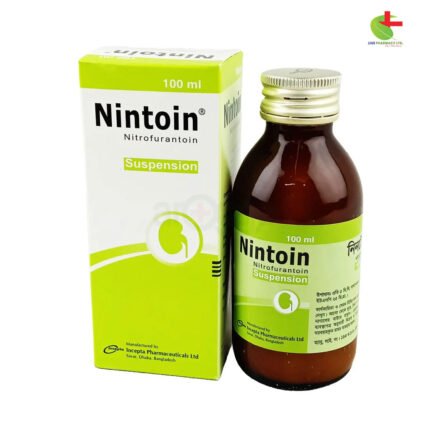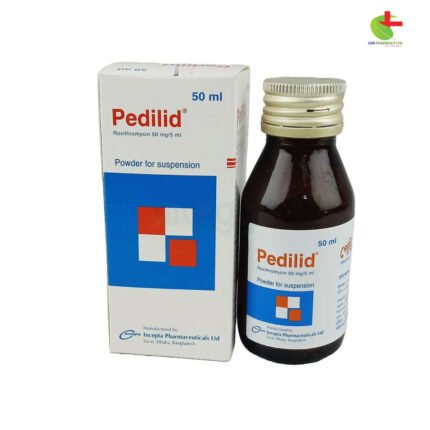Omenix Sachet 20
180.00৳ Pack(30)
- Omenix is a proton pump inhibitor indicated for the treatment of various conditions, including gastric and duodenal ulcers, gastro-esophageal reflux disease, and Helicobacter pylori-induced peptic ulcers.
- It works by inhibiting gastric acid secretion through the hydrogen-potassium-adenosine triphosphatase enzyme system.
- Omenix is available in oral and intravenous forms, with specific dosages for different conditions.
- Common side effects include headache, gastrointestinal disturbances, and skin reactions.
- Caution is advised when used with certain medications, and it should be avoided in patients with known hypersensitivity.
 Brand
Brand
|
Incepta Pharmaceuticals Ltd |
|---|---|
 Generics
Generics
|
Omeprazole |
 Type
Type
|
Oral Powder |
Indications
Omenix is prescribed for the treatment of:
- Gastric and duodenal ulcers
- Duodenal and gastric ulcers associated with NSAIDs
- Preventive treatment for patients with a history of NSAID-related duodenal and gastric ulcers
- Gastroesophageal reflux disease (GERD)
- Long-term management of acid reflux disease
- Acid-related dyspepsia
- Severe ulcerative reflux esophagitis
- Prevention of acid aspiration during general anesthesia
- Zollinger-Ellison syndrome
- Peptic ulcers induced by Helicobacter pylori
Consult a registered healthcare professional before use.
Pharmacology
Omeprazole, a member of the benzimidazole class, functions as a potent inhibitor of gastric acid secretion. It acts by blocking the hydrogen-potassium-adenosine triphosphatase (H+/K+ ATPase) enzyme system found in gastric parietal cells. After oral administration, the antisecretory effects begin within one hour, reaching peak effectiveness in two hours, with a duration of action lasting up to 72 hours. Upon discontinuation, gastric secretory activity gradually resumes within 3 to 5 days.
Dosage
Oral Administration:
- Benign gastric and duodenal ulcers: 20 mg once daily for 4 weeks (duodenal ulcer) or 8 weeks (gastric ulcer). For severe or recurrent cases, increase to 40 mg daily. A maintenance dose of 20 mg once daily is recommended for recurrent duodenal ulcers, with 10-20 mg daily for relapse prevention.
- NSAID-associated ulcers: 20 mg once daily for 4 weeks; extend for an additional 4 weeks if not fully healed. Prophylactic dose: 20 mg daily for those with a history of NSAID-related ulcers.
- Gastroesophageal reflux disease: Start with 20 mg once daily for 4 weeks; extend for another 4-8 weeks if needed. For refractory cases, 40 mg once daily for 8 weeks is recommended, with a maintenance dose of 20 mg once daily.
- Long-term management of acid reflux: 10-20 mg daily.
- Acid-related dyspepsia: 10-20 mg once daily for 2-4 weeks.
- Prevention of acid aspiration: 40 mg on the evening before surgery, followed by 40 mg 2-6 hours prior to the procedure.
- Zollinger-Ellison syndrome: Initial dose of 60 mg daily; typical dosage ranges from 20-120 mg daily (doses over 80 mg should be split into two doses).
- Helicobacter pylori eradication in peptic ulcer disease: 20 mg twice daily in combination with specific antimicrobial agents: Amoxicillin 500 mg and Metronidazole 400 mg three times daily for one week; or Clarithromycin 250 mg and Metronidazole 400 mg twice daily for one week; or Amoxicillin 1 g and Clarithromycin 500 mg twice daily for one week.
- Pediatric use in severe ulcerative reflux esophagitis (Children >1 year): 10-20 mg once daily for 4-12 weeks (body weight 10-20 kg); 20-40 mg once daily for 4-12 weeks (body weight over 20 kg).
IV Injection:
- Acid aspiration prophylaxis: Administer 40 mg slowly (over 5 minutes) via intravenous injection, one hour before surgery.
- For duodenal ulcers, gastric ulcers, or reflux esophagitis: If oral medication is not feasible, administer Omeprazole IV 40 mg once daily.
- Zollinger-Ellison syndrome: Initial intravenous dose of 60 mg daily, with adjustments made based on individual patient needs. Doses exceeding 60 mg should be divided and administered twice daily.
Consult a registered healthcare professional before use.
Administration
IV Injection Instructions: Omeprazole lyophilized powder for intravenous use only. For administration, dissolve the powder in 10 ml of water for injection. Administer the reconstituted solution slowly over 2 to 5 minutes at a maximum rate of 4 ml/minute. Use only freshly prepared solutions within 4 hours of reconstitution.
IV Infusion Instructions: Dissolve the contents of one vial in 100 ml saline or 5% Dextrose for infusion. Administer the IV infusion over 20-30 minutes or more. Use the solution within 12 hours (saline) or 6 hours (5% Dextrose). Do not mix or co-administer with other drugs in the same infusion set.
Consult a registered healthcare professional before use.
Interactions
Omenix may reduce the absorption of ketoconazole due to decreased intragastric acidity. As Omenix is metabolized by liver enzymes (cytochrome P450), it may prolong the elimination of diazepam, phenytoin, and warfarin. Patients on warfarin or phenytoin should be monitored, as dose adjustments may be necessary. However, Omenix at 20 mg daily does not significantly alter phenytoin levels or coagulation times in patients on continuous therapy with warfarin. Co-administration with clarithromycin may increase plasma concentrations of Omenix, which can be beneficial during Helicobacter pylori eradication therapy. There are no known interactions with phenacetin, theophylline, caffeine, propranolol, metoprolol, cyclosporin, lidocaine, quinidine, estradiol, amoxicillin, or antacids. The absorption of Omenix is unaffected by alcohol or food, and there are no known interactions with piroxicam, diclofenac, or naproxen, making it a safe option for patients requiring ongoing treatment. Notably, the co-administration of Omenix with digoxin may increase digoxin bioavailability by 10% due to a rise in intragastric pH.
Contraindications
Omeprazole is contraindicated in individuals with known hypersensitivity to the drug. When gastric ulcers are suspected, malignancy must be ruled out prior to initiating omeprazole therapy, as symptom relief can mask a diagnosis.
Side Effects
Omenix is generally well-tolerated, with most adverse reactions being mild and reversible. Reported side effects may include skin rash, urticaria, and pruritus, which typically resolve after treatment cessation. Isolated cases of photosensitivity, bullous eruptions, erythema multiforme, angioedema, and alopecia have been noted. Gastrointestinal disturbances such as diarrhea, headache, constipation, nausea, vomiting, flatulence, and abdominal pain may occur, although these symptoms usually resolve post-treatment. Rarely reported effects include dry mouth, stomatitis, and candidiasis. Neurological symptoms such as dizziness, light-headedness, and fainting may also occur but typically resolve after stopping the medication. In severely ill patients, reversible mental confusion, agitation, depression, and hallucinations have been documented. Other rare side effects include blurred vision, taste disturbances, peripheral edema, increased sweating, gynecomastia, leucopenia, thrombocytopenia, agranulocytosis, pancytopenia, anaphylactic shock, malaise, fever, bronchospasm, encephalopathy in patients with severe liver disease, hepatitis with or without jaundice, and, rarely, interstitial nephritis and hepatic failure. Increases in liver enzymes have been observed in some patients.
Pregnancy & Lactation
Three prospective epidemiological studies have shown no adverse effects of Omeprazole on pregnancy or fetal health. Omeprazole can be safely used during pregnancy. There is insufficient data on its passage into breast milk; therefore, breastfeeding should be discontinued if Omeprazole is deemed essential.
Use in Children & Adolescents
Safety and efficacy of Omeprazole have not been established in pediatric patients under 18 years of age.
Precautions & Warnings
Avoid using clopidogrel concurrently with Omenix, as the effectiveness of clopidogrel may be reduced. Observational studies suggest that prolonged PPI therapy could be linked to an increased risk of osteoporosis-related fractures (hip, wrist, or spine). Long-term use of Omenix may also lead to atrophic gastritis, as seen in gastric biopsies. Caution is advised when combining PPIs with methotrexate, as this may result in methotrexate toxicity.
Therapeutic Class
Proton Pump Inhibitor
Storage Conditions
Store in a dry place away from light and heat. Keep out of reach of children.













Reviews
There are no reviews yet.